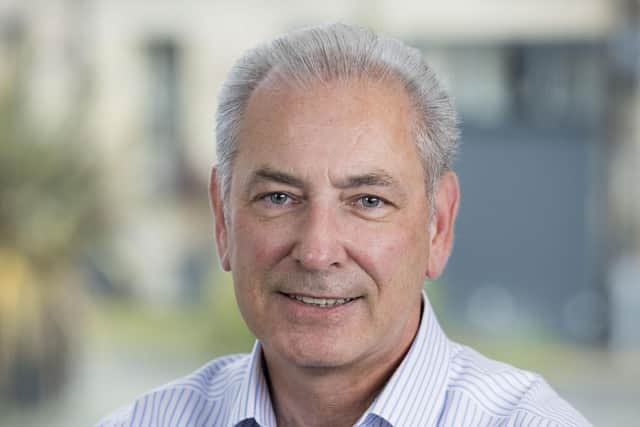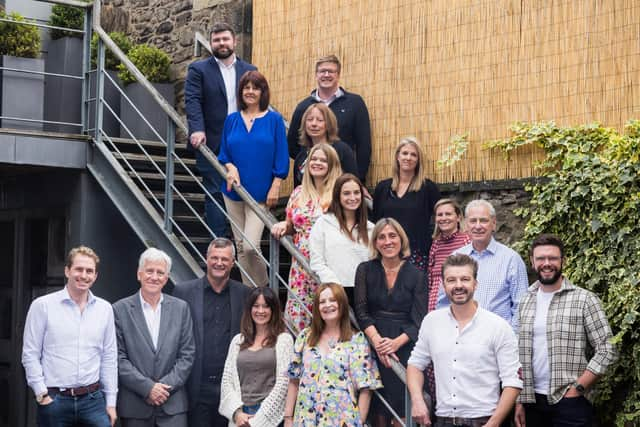Seeking 'some return to normality' - Par Equity's Paul Munn eyes 2024 after a year of ups and downs
Paul Munn is eyeing the new year with “signs of confidence” as he reflects on a milestone 2023 that saw the Edinburgh-based venture capital firm that he manages give Scotland’s tech sector a £100 million lift.
Par Equity secured first close for its latest venture fund - Par Equity Ventures I - in October. Backed by cornerstone funding from the Scottish National Investment Bank, Strathclyde Pension Fund, British Business Investments, the University of Strathclyde, several family offices and a significant number of Par Equity’s angel community, the fund is designed to accelerate some of Scotland and the north of England’s most promising technology scale-ups.
Advertisement
Hide AdAdvertisement
Hide AdThe fund, which will be managed from Par’s Edinburgh office, provides a significant boost to the prospects of scale-up companies north of the Border, coinciding with a more challenging fundraising environment. Access to funding was highlighted as a barrier to the sector reaching its full potential in Mark Logan’s review of the Scottish tech ecosystem.


Having secured a first close of £67m for the fund, Munn said he was hopeful of achieving the £100m target by the spring, revealing that there were “quite a number of positive conversations going on”.
He said: “We have 12 months since the first close but we will probably see final close around April or May time. I can understand it from an investor’s point of view - why would they spend a lot of time and diligence on something that may or may not happen? And until you get to that first close, in reality, it may or may not happen. But now it’s real and alive and we’ve made our first couple of investments from the fund which gives us something to shout about with potential second close investors. So it’s going well.”
Munn was among the founders of Par Equity in 2008, alongside Robert Higginson, Paul Atkinson and Andrew Castell, and the firm itself has invested in excess of £160m into around 80 early-stage technology companies, leveraging a further £270m or so of capital from third party investors. There have been some 30 realisations to date, including Edinburgh-based Current Health, which was Europe’s second-largest digital health exit ever following its sale to Best Buy.
Par’s focus is directed towards climate tech, health and medical technologies and industrial tech. However, the past 12 months has been a challenging period for funding in general, with activity cooling after a strong run for tech businesses during the pandemic as lockdowns saw demand for digital services soar.


“There has been an impact across the whole funding scene,” observed Munn. “The more consumer-related tech really took off during the pandemic as we were all at home with nothing else to do. It all got very frothy. And then it came back down to earth with a bump. There were falling valuations and big sell-offs in the tech sector.
“Much of that was very consumer and media focused,” he noted. “WeWork would be a good example of that bubble effect. Essentially what was a property business was dressed up as a tech player and the valuation went to the moon. It’s definitely spooked investors.”
A report last month suggested that the amount of venture capital funding pumped into fledgling Scottish businesses leapt in an “outlier” third quarter, thanks to a handful of high-value deals, though 2023 is set to be significantly quieter than previous years. During the three months to the end of September, 28 deals worth a combined £202m took place, marking the highest value quarter in Scotland since the second quarter of 2022 when £325m was recorded across 45 deals, according to KPMG’s latest Venture Pulse report.
Advertisement
Hide AdAdvertisement
Hide AdDespite the spike in values, 2023 as a whole is set to be much quieter than previous years for Scottish venture capital investment, experts predicted. The value of the first three quarters of this year stood at £335m, significantly lower than the same totals for 2021 (£529m) and 2022 (£623m), when the market was exceptionally busy in the wake of pandemic lockdowns.
Munn said raising funds had been difficult over the last 18 months with valuations “very depressed” amid an inflationary backdrop and general economic and geo-political uncertainty.
“We have seen companies in Scotland doing a lot of follow-on rounds and bridge rounds just trying to keep the lights on,” he said. “They have a squeeze coming from their customers while trying to cope with high taxation and cost inflation. It has been a difficult time for companies to raise money - a difficult time for VCs to raise money.”
Munn is hopeful that interest rates have peaked and the coming year will see “some return to normality”. He said: “I am actually quite optimistic about 2024. There are signs of confidence and stability returning, so hopefully we will see a few more transactions.”
Scotland is “very fortunate” in having an active and experienced business angel network, according to Par Equity’s managing director. He highlights the ready access to early-stage capital that is available and also the support from the likes of local government, Scottish Enterprise and the Scottish National Investment Bank. “It’s the next level that is the challenge,” he said. “At Par, we’ve been writing cheques from about £500,000 up to £3m but the new venture fund is the thing that will allow us to do the £4m to £10m stuff.
“You need to be geographically focused and close to the companies if you are going to give that help. We helped build Current Health to a significant exit but they have maintained their engineering and technical base in Scotland. It doesn’t mean that we lose these companies. Yes, there are potential unicorns in Scotland but they won’t happen without having access to capital. That gap was highlighted by Mark Logan in his report. If businesses can’t find the capital here then they will move to where they can.”
Comments
Want to join the conversation? Please or to comment on this article.